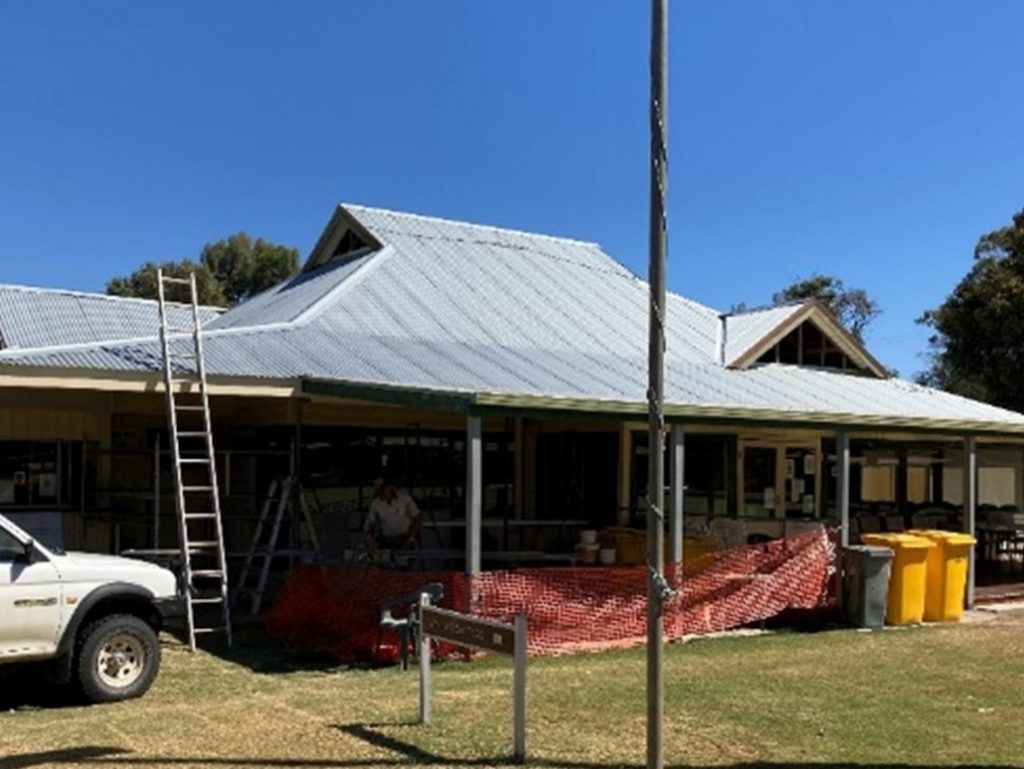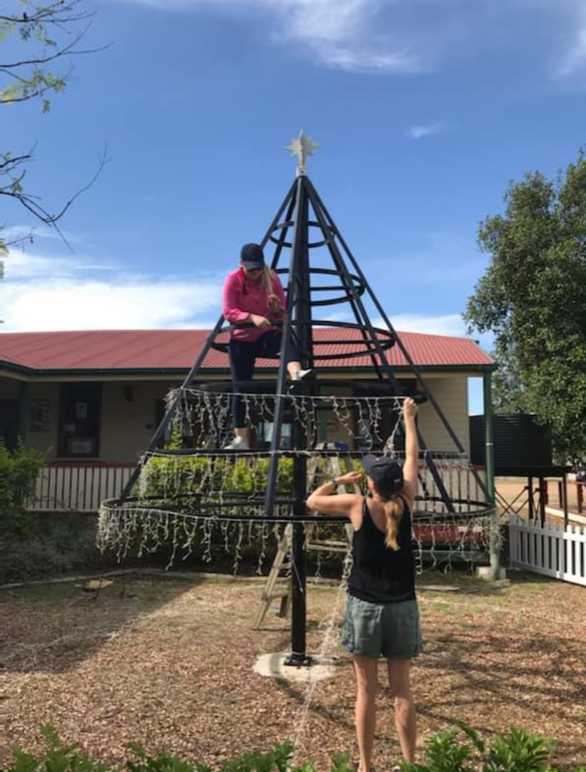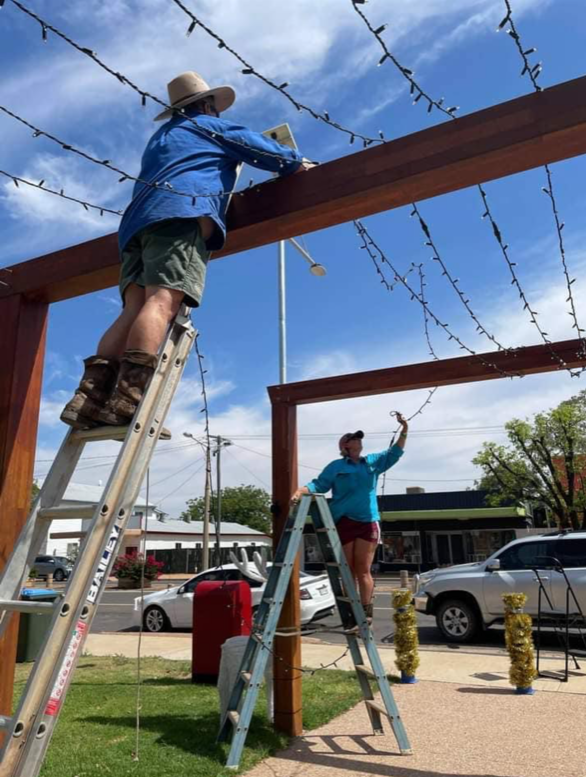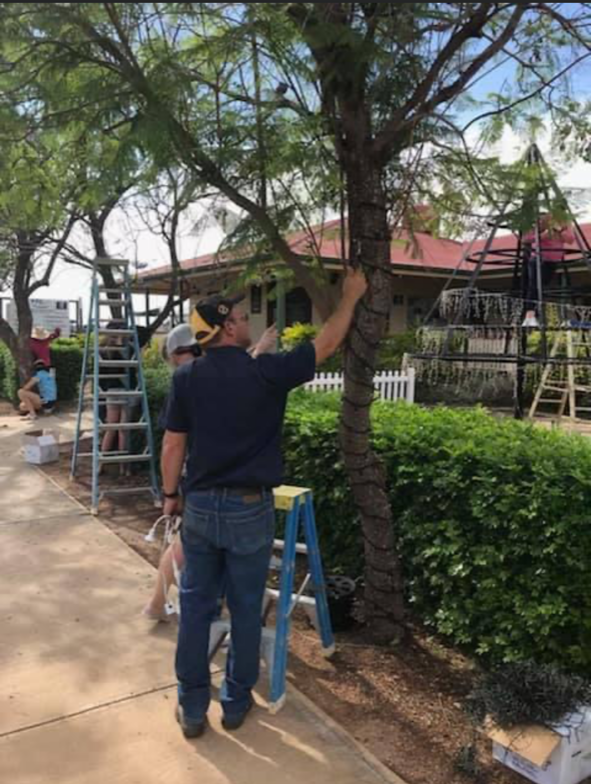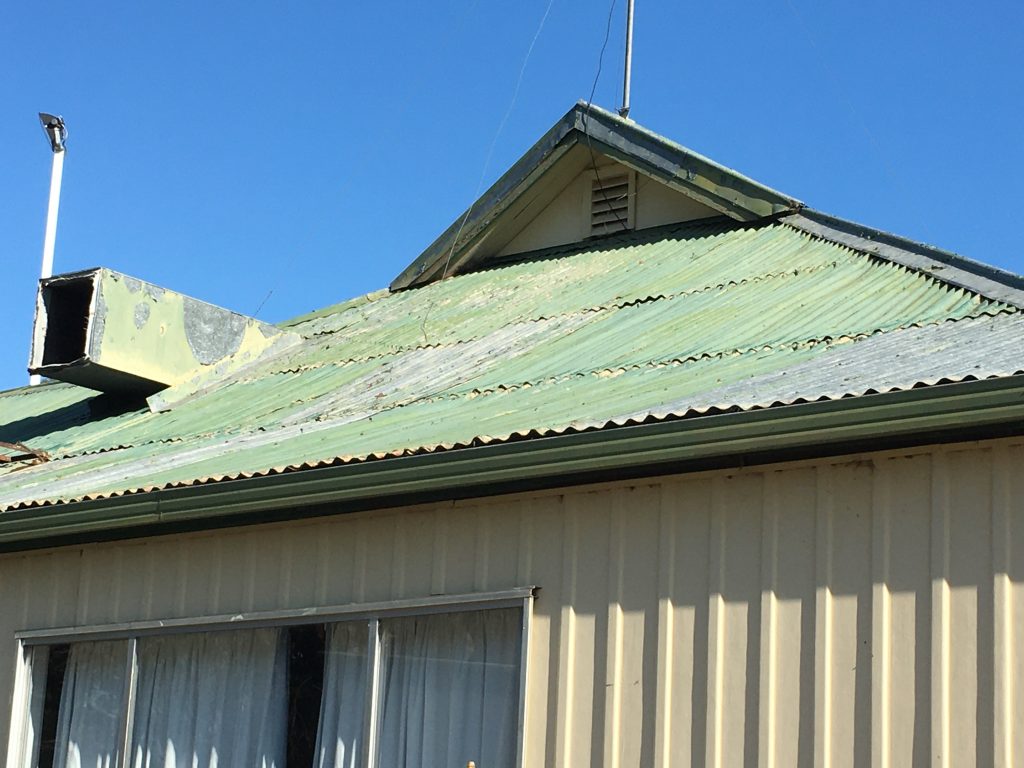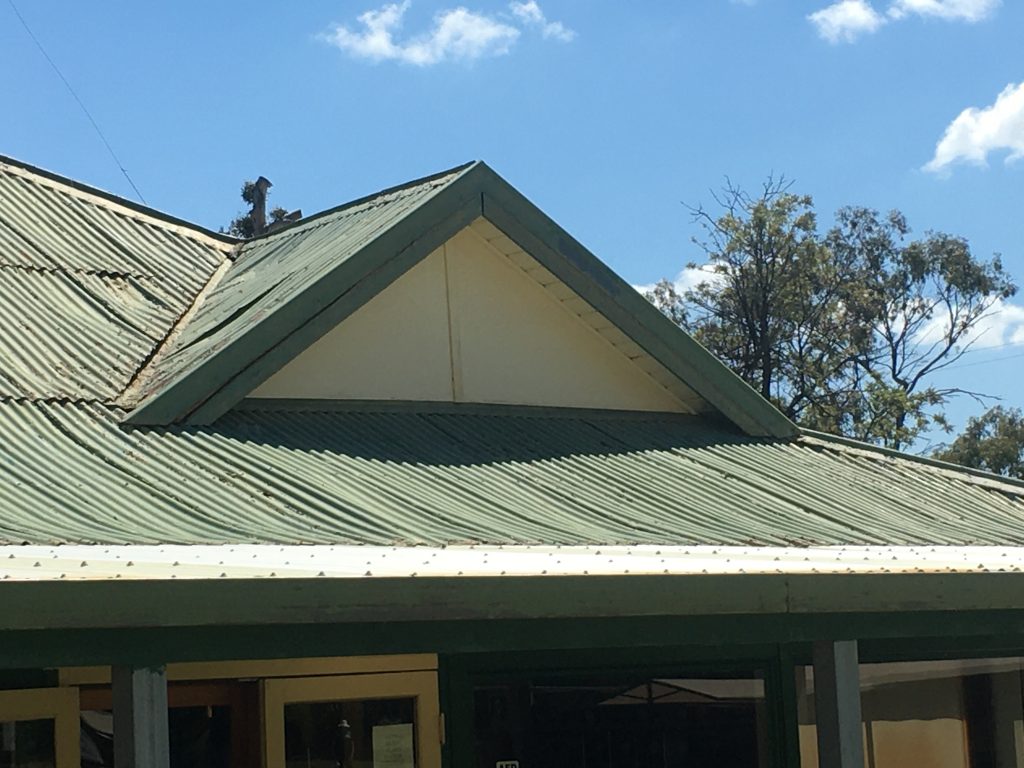Foundation for Rural & Regional Renewal (FRRR)
Earlier this year, the FRRR team heard directly from Kempsey Shire Council, who had recently received a $56,960 grant for the Macleay Valley River to the Sea Festival through the Future Drought Fund’s Networks to Build Drought Resilience program, co-funded by the Australian Government and a private donor.
The festival was a creative way to increase opportunities for diverse people and communities to participate in networking events. A series of farm gate tours was also a great way to improve regional branding and recognition of local food agri-systems. The festival built knowledge and understanding of the risks posed by drought and climate change through workshops for primary producers and broadly contributed to building a positive community culture and strengthened connections.
The Kempsey Shire Council presentation also highlighted the broader impact of floods. Having experienced 19 climate disasters in a decade, Kempsey was labelled ‘the most disaster-prone region in Australia’ by The Australian in 2019. Since then, there have been four flooding events, with three of them taking place in 2022 alone.
The Council team shared that an increasing number of farms were at risk of closure due to recent flooding events with around 45% of cattle in the lower Macleay leaving the shire due to continued wet and a 25%-35% loss of avocado trees. On top of that, there were large scale loss of oysters, flower production was impacted and mud fever, foot abscesses, slips and trips all became more common in horses.
The presentation gave a raw and up-to-date glimpse into the challenges being faced by those in the agricultural sector. It also highlighted that to be sustainable both economically and environmentally, change is needed. For agriculture to thrive, communities and agribusiness must be given the tools and resources they need to adapt.
The Macleay Valley River to the Sea Festival was a great example of this kind of opportunity in action, allowing farmers to share their stories and raise awareness around the positive on-farm diversification being achieved in environments impacted by climate change.
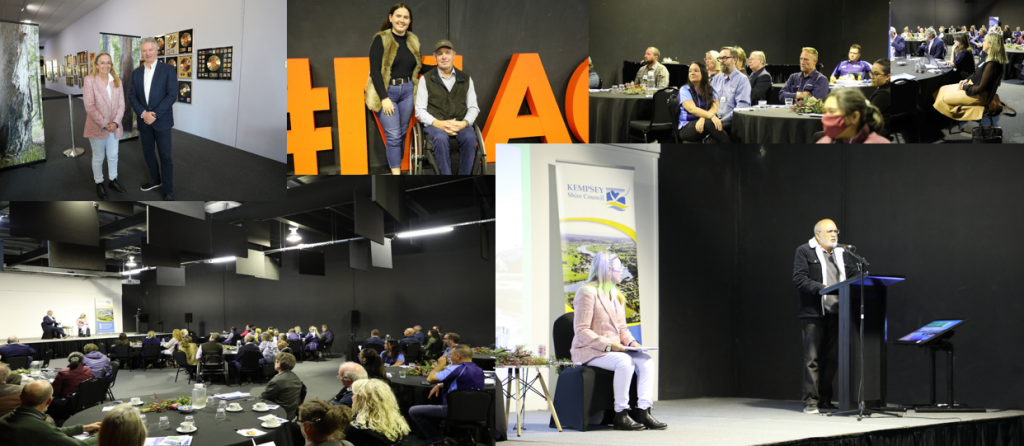
The Foundation for Rural & Regional Renewal today welcomed the expansion of the place-based Investing in Rural Community Futures (IRCF) program to the Bega Valley, thanks to an injection of $1.3 million through the Australian Government’s Black Summer Bushfire Recovery Program.
IRCF is a grassroots program aimed at building and supporting the capacity of not-for-profits so they in turn can support social, economic and built environment recovery. By working locally over the next two years, it aims to strengthen local not-for-profit (NFP) organisations and ultimately enable them to thrive, which in turn will have a positive impact on community wellbeing and sustainability. It is based on a mix of local on-the-ground support, access to workshops and training and collaboration with local community groups.
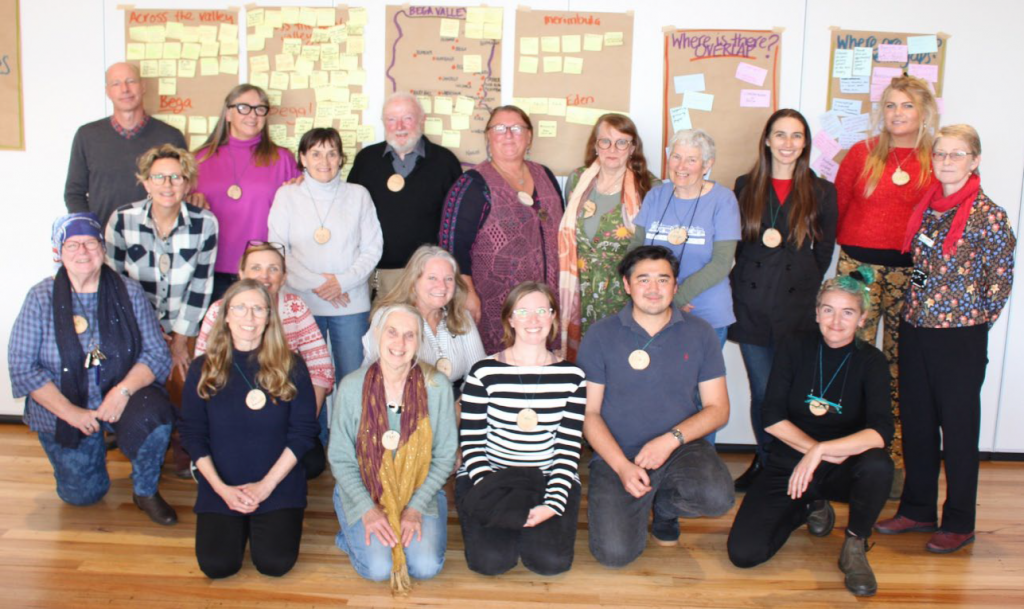
The IRCF Bega Valley – Resilience Connection and Place Project builds on the Investing in Not-for-Profit Capacity program, which FRRR has been running in Bega over the last 18 months.
The investment will allow for two community development project officers to be appointed – one full time, one part-time – in partnership with the Bega Valley Shire Council. They will work closely with local NFP organisations and community groups, including the three Local Aboriginal Land Councils (LALC’s).
An important part of the program will be to develop a ‘roadmap’ for the local not-for-profit and community sector, to identify common areas of interest, shared assets and needs for capacity building. Once these needs are identified, the IRCF Community Development Project Officers will develop relevant resources and help facilitate training and other support to help NFP’s to maximise the impact of their work. They will also provide support in accessing other grant funding for the various groups that get involved.
The program will also deliver leadership training into the community, thanks to a partnership with the Australian Rural Leadership Foundation.
FRRR’s People Programs Portfolio Lead Deb Samuels says that this really is a collaborative, community-driven program.
“FRRR has worked hand in hand with community groups over the last 20 plus years, so we know that locals are best placed to know what they really need. Our role is simply to help facilitate the support that they need – and that’s exactly what this program is going to do.
“We’ve rolled out this model successfully now in seven other locations across NSW, so we know that this approach of bringing local NFPs and community groups together really works, especially when you combine it with on-the-ground facilitators. Together, they can identify common issues and opportunities and collectively prioritise where investment is needed, and what form it should take – including paying particular attention to ensuring it’s inclusive and culturally appropriate – to build their capacity as a sector.
“We’ve seen some fantastic spin-off investment and leveraging of resources and we fully expect the same to happen in Bega Valley communities. We’re really excited to get started!” Ms Samuels said.
Applications are now also open for the two facilitator roles, with details on the Bega Valley Shire Council site.
Designing and tailoring the IRCF program is a highly collaborative process. The next step is for FRRR, Bega Valley Shire Council and Australian Rural Leadership Foundation to meet with some key local leaders and start to map out how to harness this opportunity to build on what is already happening in the Bega Valley.
To find out more about the IRCF program or to get involved, visit ircf.frrr.org.au/Bega or contact FRRR Carolyn Ardler, IRCF Program Coordinator – South Coast on 1800 170 020.
On Koa Country
Outback Festival Inc is situated in the Queensland outback town of Winton, a 10-hour drive from Cairns. They’re a not-for-profit organisation that was formed in 1972 when the inaugural Winton Outback Festival took place. Since 1973, the festival has been held biennially and has grown from a small-town event attracting fewer than 1,000 visitors to a major regional event that drew in a record 14,976 attendees over the five days – pretty impressive for a town of only 900 people!
With the help of a $45,000 FRRR grant, funded by the Australian Government through the Tackling Tough Times Together program, Outback Festival Inc was able to host one of their largest Festivals capitalising on the holidaying demographic contained to Queensland due to state borders being closed. The theme was ‘Giants of the Outback’ which showcased the story of Qantas and the role that Australia, and the historic town of Winton, has played in the history of air travel.
In 2021, the festival was more crucial to the community than ever, as a lot of locals in Winton and the surrounding towns were feeling socially isolated following the COVID pandemic, not to mention the hit that the economy had taken due to the absence of visitors and tourists.
The festival was hailed an amazing success, with a record 80% increase in numbers that saw upwards of 4,000 visitors book out nearby motels, camping grounds and hotels. Families from all around Queensland road-tripped their way to Winton for an outback school holiday experience.
People from all ages and backgrounds participated in and attended open air concerts, family sports events, arts performances, workshops and even watched a stunning pyrotechnic display.
Winton is known as the birthplace of Qantas and so, to celebrate 100 years of Qantas, a sunset gala dinner with the theme “Centenary of Flight” was held on the Winton airport tarmac with over 300 guests attending along with the 2nd Cavalry Regiment as invited guests.
As a result of the Outback Festival, Winton got a much-needed influx of revenue with more than $1.2 million being spent by attendees during the five days of quintessential Aussie fun. Local business operators reported huge spikes in trading, with some seeing an increase of up to 127%.
For more inspiring stories like this, head to our FY 2021/22 Annual Review.
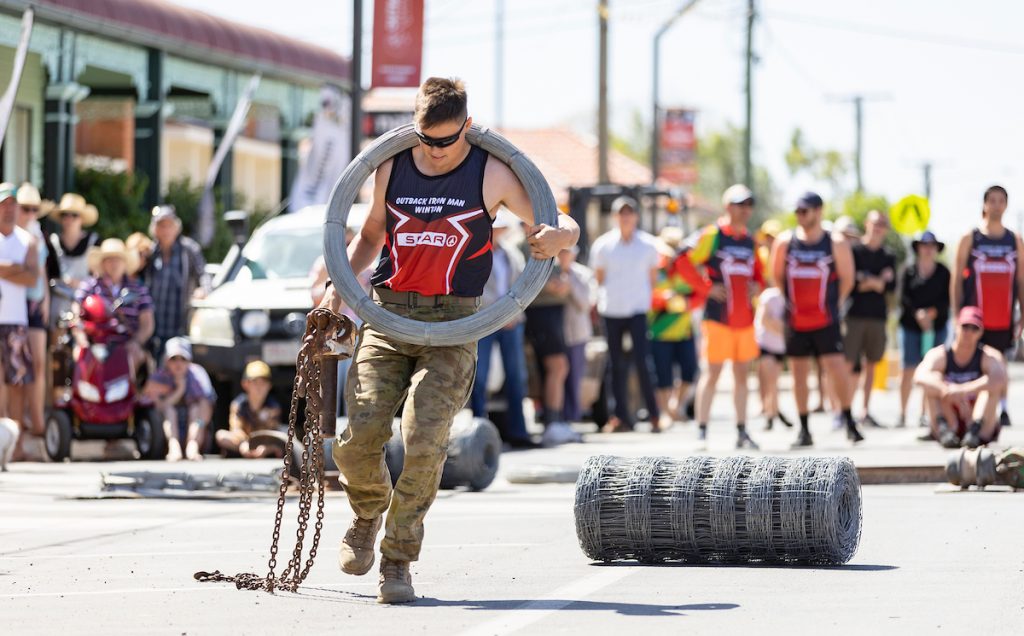 Photos were captured by Barry Alsop of Eyes Wide Open.
Photos were captured by Barry Alsop of Eyes Wide Open. Photos were captured by Barry Alsop of Eyes Wide Open.
Photos were captured by Barry Alsop of Eyes Wide Open.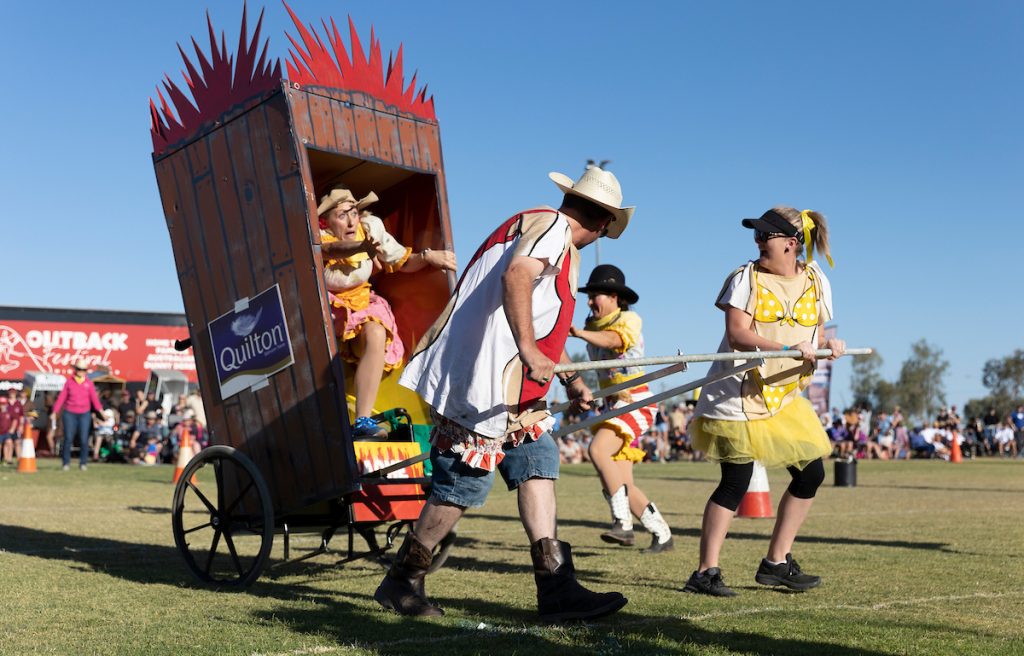 Photos were captured by Barry Alsop of Eyes Wide Open.
Photos were captured by Barry Alsop of Eyes Wide Open.
Picture this: the year is 1919 and you’re standing on the white sandy beach of Lucky Bay on the Eyre Peninsula coast in South Australia, looking up at the first beach shack to be built on the beach. The sun is warm, the water is perfect, and Lucky Bay is the idyllic holiday spot for the surrounding communities of Cowell, Kimba and Cleve.
Now in the 21st century, there are 125 beach shacks, and families from all around still come to visit the Bay!
The Lucky Bay Shack Owners Association (LBSOA) was established in 1950, and its role is to improve the environment and lifestyle of the Lucky Bay settlement for all residents and visitors to enjoy. This includes making sure the beach and local facilities are ship shape and ready to go for incoming holiday makers who are able to rent the beach shacks, as well as local fishermen and caravanners who use the facilities.
With an active role in the community, LBSOA wanted to do something that would bring some joy and a smile to the faces of the visitors to their little town. After prolonged drought, many locals were finding that holidaying with the family was simply a luxury not afforded, especially with livestock to attend to. But Lucky Bay is only 15 km north of Cowell, which makes it a perfect location for farming families to escape to, while still being able to tend to their farms.
Safe play = laughing children and happy parents
LBSOA sought funding from FRRR through the Tackling Tough Times Together (TTTT) program to support their ‘Laughter at Lucky Bay’ project, which would see a three staged plan to make the holiday destination more enticing by developing a child safe playground and surrounding facilities for parents and adults to enjoy.
Funded by the Australian Government, LBSOA received a $51,597 TTTT grant towards stage one of the plan: the purchase of new playground equipment, shade structures, soft fall sand, and fencing.
LBSOA’s President Sue Chase said they were overwhelmed by the community response, once they saw the works underway.
“What we were most astounded by is people’s enthusiasm to participate in working bees, and I think this stemmed from them seeing the playground come to life. Many people in the community provided their time to get the playground up and running. We are also proud of the funds we have raised. Our first ambition was to raise enough funds to contribute our share to the ‘Laughter at Lucky Bay’ playground project. However, we were amazed at the success of our fundraising, which, together with the other grants we received, allowed us to construct a shelter and install a BBQ shed and storage area near the playground,” she said.
The official opening of the playground in January 2021 was attended by hundreds of people who enjoyed the food stalls, jumping pillow, face painting and crab racing activities on offer.
These events not only raised vital funds to support the upkeep of the facilities, but also reinforced a real sense of community participation, lots of fun and helped people get to know one another better.
When asked what they were most proud of, LBSOA said the sheer number of children and even teenagers taking full advantage of the new playground made them so pleased. Extra facilities like a table and chairs and the BBQ have also encouraged parents and adults to spend time together and socialise, giving them a break from the ongoing pressures and stressors that drought can bring.
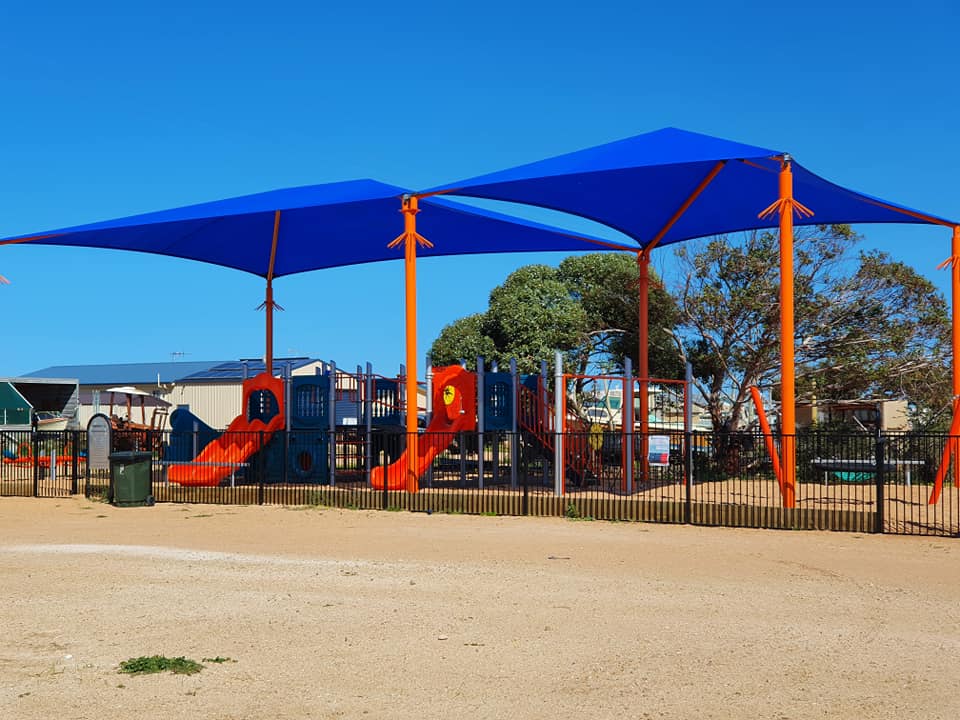
Local NFP groups sought as lead partners in 35 regions across remote, rural and regional areas
Following the announcement by Senator The Hon. Murray Watt, Minister for Agriculture, Fisheries and Forestry, the Foundation for Rural & Regional Renewal (FRRR) and the Australian Rural Leadership Foundation (ARLF) are pleased to announce the opening of the first program in the Helping Regional Communities Prepare for Drought Initiative.
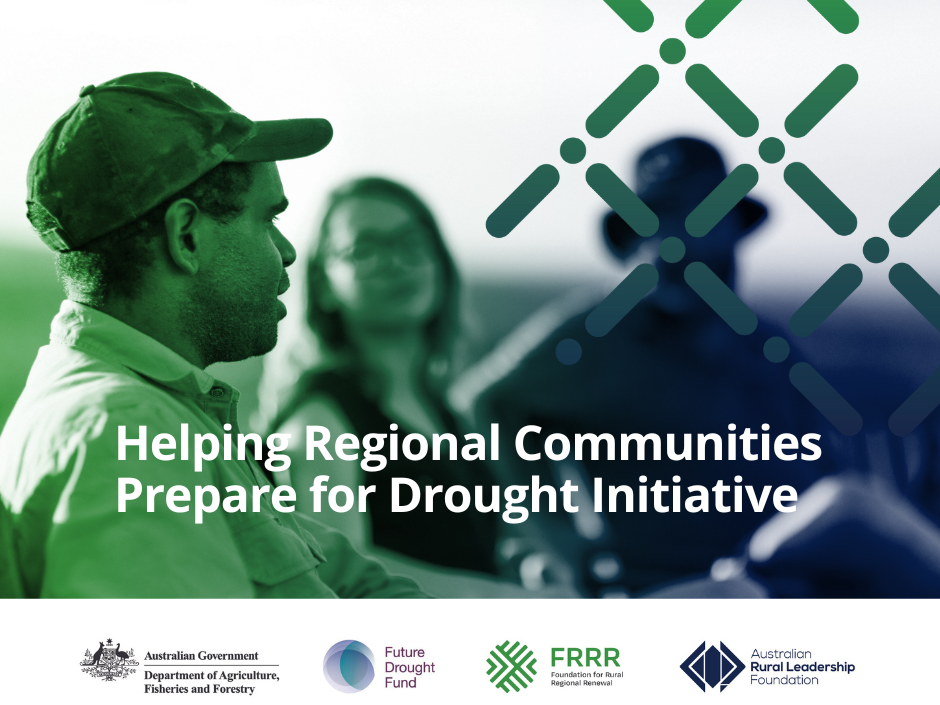
The Initiative is funded through the Australian Government’s Future Drought Fund and designed to help agriculture-dependent communities across remote, rural and regional Australia enhance their preparedness for drought.
The $29.6 million investment over three years builds on the Future Drought Fund’s previous Networks to Build Drought Resilience program (led by FRRR) and the Drought Resilience Leaders program (led by ARLF).
There are five elements to the Initiative, the first of which is the Community Impact Program. This is a place-based program designed to support community members and not-for-profit organisations in 35 regions across remote, rural and regional Australia to drive local action that helps prepare for drought. An integrated package of support for community networks, there are two main components:
FRRR’s Disaster Resilience and Climate Solutions Portfolio Lead Nina O’Brien said that the program takes a place-based approach, recognising the need for a bespoke approach in different communities.
“Rural communities are better able to withstand the impacts of events like drought when they are strong and well connected. The overall aim of this program is to facilitate increased social connection, strengthen network opportunities and link capacity building opportunities to ensure widespread local benefit, so that communities are better prepared for the future.
“That will look different in each community, which is why we’ll be working alongside community members and organisations to drive local action that best helps each community prepare for drought.
“We’ve clustered LGA’s into 35 regions and we’re seeking a locally-based not-for-profit to act as the lead applicant and work collaboratively with other local organisations to plan and undertake activities that increase drought preparedness over a multi-year period.
“The program has an emphasis on engaging First Nations communities and younger people in leading drought resilience planning and action.
“The Community Impact Grants can fund projects, events, initiatives, training, capability building and small-scale community infrastructure projects.
“This will be a very collaborative program, with FRRR and ARLF working closely on the ground with the successful communities to define priorities, scope and delivery of the project. In addition, there will be access to expertise and networking opportunities,” Ms O’Brien explained.
As part of the program, ARLF will offer a number of optional and complementary Leadership Development Activities at no cost to the successful applicants. These are designed to strengthen the leadership capabilities of communities to build individual and community drought resilience.
ARLF’s Chief Executive Officer Matt Linnegar said that because every lead organisation and region will be at a different point in their resilience journey, ARLF has a number of options that communities can tap into.
“We have five leadership development activities, ranging from intensive residential leadership programs to a series of deep-dives into particular leadership topics to group coaching. Each is underpinned by the concepts of adaptive leadership, resilience and network leadership.
“Applicants will need to include their preference for leadership development activities when they lodge their express of interest for the Community Impact Program, and we will work closely with applicants to refine their preferences as we move through the collaborative project design phase,” Mr Linnegar explained.
The locations and projects in each of the 35 regions will be chosen based on potential drought impact, community readiness and complementarity with other government and philanthropic investments.
Learn more about the program by visiting www.frrr.org.au/impact-program.
Interested groups can also join an online Information Session on 1 September at 12pm AEST. Register here: https://rural-leaders-au.zoom.us/meeting/register/tZIocOmsqzIvH9Re35odkOG0yqt99F7BPEga
FRRR has today welcomed the extension of DGR-1 status for the country’s Community Foundations, in particular those in regional areas, which was confirmed in Tuesday night’s Budget announcements. This special status means that from 1 July, they can directly receive tax deductible donations from a broader range of donors to support more place-based philanthropy, which FRRR has long-championed.
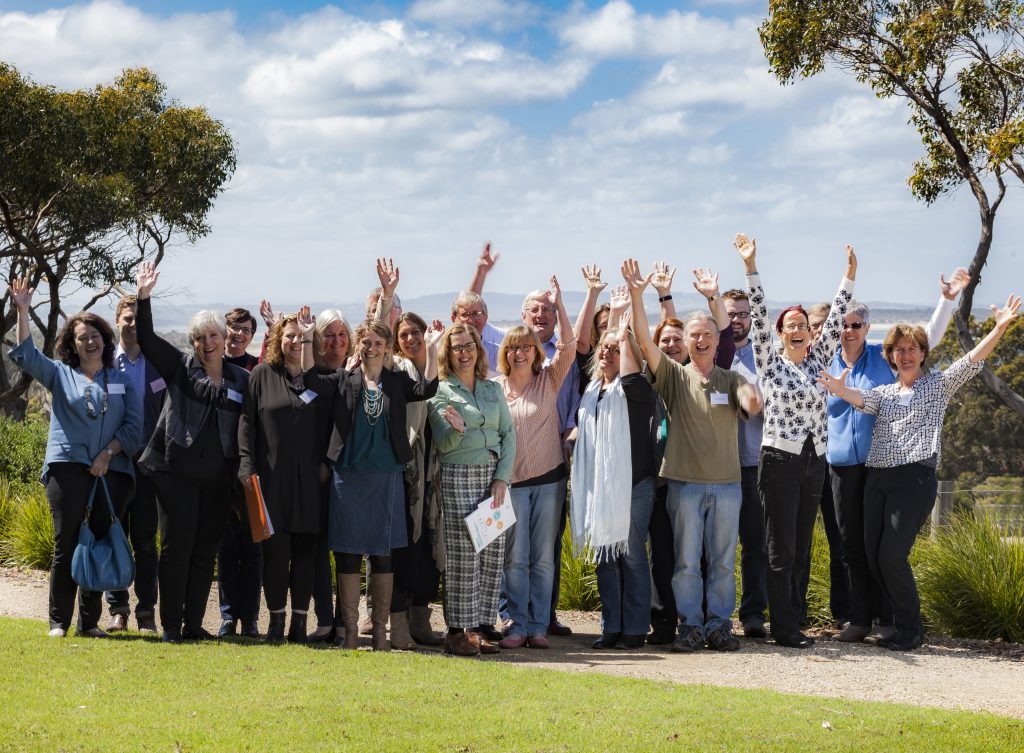
Place-based approaches are critical, especially given the compounding impacts of back to back disasters and the challenges and opportunities in each community. They allow local people to prioritise resources to deliver outcomes that they know will make the most impact, taking account of the unique circumstances of every place.
For the rural and regional communities that have a local Community Foundation that is a member of Community Foundations Australia, this legislative change will mean that they will soon be able to directly accept tax deductible donations to channel toward their local community needs, as well as give to local community organisations that do not have DGR-1 status.
FRRR CEO, Natalie Egleton, says that this reform paves the way for much-needed additional local giving, and that FRRR will continue to support rural communities across Australia to address local and regional issues.
“FRRR was established in 2000 through a partnership between the Australian Government and philanthropy to facilitate long-term and flexible funding to reach and stay in remote, rural and regional communities. In fact, we were set up to address many of the issues raised in the Pride of Place Inquiry, which recommended this DGR extension. We have long championed the important role of place-based philanthropy and indeed, have channelled more than $135 million to in excess of 12,000 projects to support local projects in remote, rural and regional Australia.
“Of this, more than $22 million has gone to support Community Foundations, with some $6 million via the 22 Community Foundations that we have partnered with through a Community Foundation Account. We are proud to have been able to help these Foundations raise and distribute those funds, and to have played a key role in the establishment, development, and promotion of the sector as a whole. We welcome this legislative reform, which will enable even more funding to be channelled locally,” Ms Egleton said.
Over the coming months, FRRR will work closely with the 19 Community Foundations that currently hold Community Foundation Fundraising Accounts and are in a position to take advantage of this legislative reform.
“FRRR will continue to back regional Community Foundations and to facilitate funding and collaborations for other remote, rural, and regional not-for-profits and community groups to advance resilient, vibrant, sustainable regional communities. Our role in connecting resources and supporting the capacity of local leaders and not-for-profit organisations, and having a long-term focus in our work, will remain a key pillar of FRRR’s work.”
Community Foundations Australia commented that “FRRR has been the engine room for the development of Community Foundations in regional Australia, where four out of five of these Foundations operate. This reform may change how we work with each other, but it does not change our shared ambition of working together to support regional community development. Our sector as a whole very much looks forward to building on our well established relationship with FRRR for mutual benefit.”
For more information on the services that FRRR offers, visit www.frrr.org.au.
FRRR has awarded $3,084,346 to 60 local not-for-profit organisations (NFPs) in remote, rural and regional Australia for grassroots initiatives that will build their community’s resilience to drought.
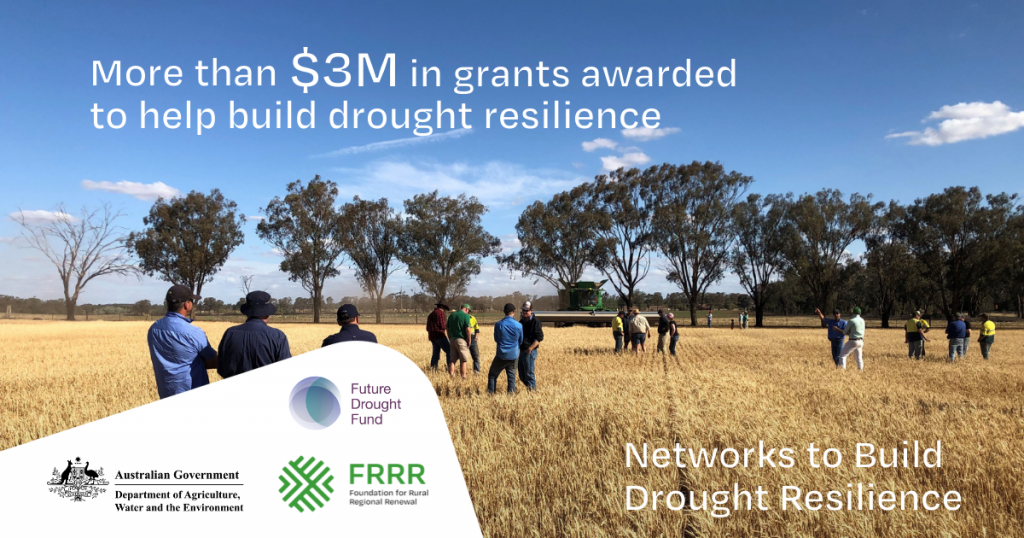
Funded by the Australian Government’s Future Drought Fund and a range of other donor partners, the Networks to Build Drought Resilience program focuses on agriculture-dependent communities. It’s designed to give local NFPs access to the funds and resources they need to prepare and strengthen their community’s response to future drought and climate change.
This second round of grants, which range from $10,120 to $150,000, sees several First Nations organisations receiving grants. The successful groups include Outback Academy Australia Ltd, which has received a grant of $146,966 to strengthen drought resilience through collaborative Aboriginal networks across several states.
There is also more funding to help women in rural communities come together, with support for projects like the Rural Women’s Gathering 2022 in South Australia. Their $27,000 grant will help to build drought resilience by facilitating professional, social and community connections among women.
Natalie Egleton, CEO of FRRR, said that this diversity in applications is what allows these programs to make a meaningful difference in local communities.
“We’ve seen community-led projects that address the needs of First Nations people, women and young people. It’s this kind of tailored approach, responding to the unique challenges of each place, that will enable these communities to build long-lasting networks to build their enduring ability to manage the future impacts of drought.”
Ms Egleton also said that despite facing many challenges, these local organisations are committed to building a better future for their communities in the long run.
“Local leaders are so impressive. Many groups were still dealing with the impacts of COVID lockdowns and restrictions, not to mention extreme weather events. These circumstances have left volunteers feeling very fatigued (as we confirmed in our Heartbeat of Rural Australia study last year), and yet these rounds saw proposals for great ideas and innovative projects put forward“.
“We’re proud to partner with the Australian Government on this program, and grateful for the additional funding we have received from our many other donors. These partnerships are vital when it comes to equipping grassroots organisations with the resources, they need to ensure their regions can thrive into the future,” said Ms Egleton.
Some more of the 60 initiatives, which are spread across every state and territory, include:
- Tharwa Community Association Inc – Tharwa, ACT – Tharwa Community Hall Critical Repair and Remediation – $20,000 – This project will support crucial repairs for the Tharwa meeting hall. The hall is a central meeting place for local farming families and fosters connectedness and the community’s capacity to respond to future drought events.
- Tamworth Regional Landcare Association – Wallabadah, NSW – Regenerative Practices on the Liverpool Plains: Learning & Working Together to Build Drought Resilience – $22,600 – This project will build drought resilience through two education events and a farm tour day to build understandings of risks posed by drought and climate change in agriculture-dependent communities of the Tamworth region. The project will encourage participants to shift from ‘season to season’ thinking to developing a long-term vision and plan which considers the impact of climate variability on their farming business.
- Young Livestock Exporters Network – Darwin & Katherine, NT and Townsvillle, Qld – YLEN Leadership Program: Future-Proofing the Livestock Industry – $45,867 – This project will support educational opportunities through two training events, a leadership program and stockperson course, designed to bring rural youth together to discuss the impacts of difficult times, including drought. These events will enable the youth participants to discuss with industry experts, topics to understand the risks posed by drought, how to plan for and manage the risks, and stress, self-care and communication during difficult times, giving the participants tools that they can share with their communities, and draw on during difficult times, including times of drought.
- Burnett Catchment Care Association – Monto, QLD – Connecting Monto producers to build resilience – $19,000 – This project will support hosting of three workshops on strategies to prepare for drought, sustainability practices and soil health during drought. Focussing on discussion about new information presented and sharing of ideas and experiences, the workshops will build locally relevant knowledge required to support the rural community’s response to the impacts of drought.
- Tumby Bay Progress Association – Tumby Bay, SA – Improving Farmer Skills in Effective Communication and Digital Literacy, Lower Eyre Peninsula – $45,000 – This project will build drought resilience through enabling 50 locals to participate in a 16-week communication and literacy training program, focussed at building participants’ capacity to network with their communities, thus building participants’ readiness to face the impacts during times of drought. The project will support ongoing community engagement through an online networking tool for the community to continue sharing ideas and experiences to continue building connectedness and a shared sense of purpose.
- Big Hart – Wynyard, TAS – The Watershed Project – $140,000 – This project will support community engagement events including three community dinners, a networking breakfast, two film screenings and two workshops across the North West coast of Tasmania to discuss topics such as water and eco anxiety, water and well-being, and water and local production. The events will be targeted across the local community to involve producers, local clubs, youth and businesses for the communities will work collaboratively to solve problems on environmental and agribusiness topics that are central to drought resilience at the local level.
- Partners in Ag Incorporated – Rupanyup, VIC – Wimmera Rural Table Gathering – $28,608 – This project will support a full day event to bring rural women together to discuss the impacts of drought and a changing climate for the region. Including a panel discussion of industry experts, participants will be involved in discussions and learnings to understand the challenges faced by communities in times of drought and how community members can develop skills and strategies to deal with difficult times, including during times of drought.
- Lower Blackwood Land Conservation District Committee – Karridale, WA – Lower Blackwood Online Community Forum & Information Hub – $49,850 – This project will build the community’s capacity to understand & implement sustainable agriculture objectives and drought resilience through an online Community Forum & Information Hub, which will provide an interactive platform to access information and resources with locally relevant information.
The full list of grant recipients and their projects are below.
| Organisation | Project | Location | Grant | |||
|---|---|---|---|---|---|---|
| AUSTRALIAN CAPITAL TERRITORY | ||||||
| Funding Tier 1: $10,000- $20,000 | ||||||
| Tharwa Community Association Inc | Tharwa Community Hall Critical Repair and Remediation
This project will support crucial repairs for the Tharwa meeting hall. The hall is a central meeting place for local farming families and fosters connectedness and the community’s capacity to respond to future drought events. | Tharwa | $20,000 | |||
| NEW SOUTH WALES | ||||||
| Funding Tier 1: $10,000- $20,000 | ||||||
| Active Farmers Ltd. | 100 Mental Health Champions
This project will support trainers and community members across 47 rural communities to attend a two-day mental health first aid course. Through the course, participants will share their skills to work with their communities to respond to the challenges that arise in rural communities during times of drought. | Mangoplah | $10,120 | |||
| Community College-Northern Inland Incorporated | Namoi Womens Shed
This project will support improvements to increase the Namoi Women’s Shed as a venue for training and collaboration. This will support the community to meet, and develop skills and social connections, that support drought preparedness. | Narrabri | $13,731 | |||
| Central West Farming Systems Inc. | CWFS Rural and Regional Women and Youth 'Just Brilliant' Conference 2022
This one-day conference will bring together rural women and young leaders with agricultural leaders to discuss personal, rural and drought resilience. The event will provide opportunity for participants to network across communities and seek guidance and mentorship to deal with the impacts of difficult times, including drought. | Condobolin | $16,210 | |||
| Cookamidgera Community Landcare Inc | Saving Cooka Hall
This project will support critical upgrades to the central community hall. This will make the hall accessible for more of the community to gather, strengthening connections and sharing of knowledge to prepare for the impacts of drought. | Cookamidgera | $16,370 | |||
| Eurobodalla Shire Council | For the Farmers - Finding connection in the country
This project will support two community networking events and a podcast series. It will strengthen community networks and engagement through regular meetings, and disseminate key drought information for the community. | Moruya | $17,270 | |||
| Adavale Lane Community Centre Incorporated | Setting Up a Connected Educational Environment to Run a Workshop on How to Prepare for a Drought
This project will support a workshop that will include insights, demonstrations and strategies that can be implemented locally to prepare for future droughts. The project will also include small upgrades to the local meeting place to improve its use for the community to share knowledge and support each other before, during and after times of drought. | Goonumbla | $17,491 | |||
| Weemelah Hall | Provide additional outdoor facilities and beautification to the Weemelah Hall Yard
This project will support improvements to indoor and outdoor facilities at the Weemelah Hall. The improvements will enable the facility to continue its vital role as a central meeting place for the community to meet, including preparing for drought. | Weemelah | $18,832 | |||
| Gwymac Incorporated | Building Farm Resilience Through More Dynamic Soils and Pastures
This project will host three workshops that will provide information on drought resilience farming and climate change. The workshops will build farmers’ and the communities’ knowledge through sharing of case studies, personal experiences and learnings. | Inverell | $18,950 | |||
| Monaro Farming Systems CMC Incorporated | Drought Preparedness on The Monaro – Feed Evaluating & Drought Planning
This project supports a three day drought preparedness workshop that will build local producers’ skills and capacity to evaluate and manage the impacts of drought. It will include sessions on risk management and planning, strategies on drought planning, and pasture management to prepare for, and during times of drought. | Cooma | $19,050 | |||
| Funding Tier 2: $20,001- $50,000 | ||||||
| Tamworth Regional Landcare Association | Regenerative Practices on the Liverpool Plains: Learning & Working Together to Build Drought Resilience
This project will build drought resilience through two education events and a farm tour day to build understandings of risks posed by drought and climate change in agriculture-dependent communities of the Tamworth region. The project will encourage participants to shift from ‘season to season’ thinking to developing a long-term vision and plan which considers the impact of climate variability on their farming business. | Wallabadah | $22,600 | |||
| Destination Tweed Ltd | Cross-Sector Connectivity: Food + Nature + Arts
This project will build drought resilience through four agri-food networking forums to strengthen understanding of risks posed by drought and climate change, and ensure the community is better positioned to adapt to future drought challenges. | Tyalgum | $25,000 | |||
| Mid Lachlan Landcare Incorporated | Using the Future to learn from past droughts
This project will support four local field days on drought resilience, on-farm drought preparedness plans and agricultural sustainability practices in the region, to build the skills of local land managers to enable them to make timely on farm decision making when dealing with the warning signs and effects of drought. | Canowindra | $27,560 | |||
| Clarence Landcare Incorporated | Clarence Landcare Agriculture Network (CLAN)
This project will support monthly field days and other events, training and meetings to provide training on best practice land and natural resource management skills for communities preparing for and responding to the impacts of drought. | Grafton | $40,520 | |||
| Glenrac Incorporated | Cultivating Skills and Community Connections for Glen Innes
This project supports a series of nine training workshops for community members and farming businesses, focussed on drought and risk management planning. The project provides additional benefit in fostering networks for new residents with limited social connections in the community. | Glen Innes | $48,340 | |||
| Bermagui Pre School Co-operative Society Limited | The Moodji Futures Project
This project will support local events including a sustainability workshop and Long Table Dinner. The events will focus on drought mitigation practices and support a shared sense of purpose and community belonging. | Bermagui | $49,000 | |||
| Caragabal Country Golf Club Ltd | Improve access, safety and efficiency of the Caragabal Country Golf Club as a community meeting place
This project will establish an online forum to increase knowledge sharing and stories across the community, and support small upgrades to the central community meeting place. These activities will improve the community’s ability to share knowledge and improve social connectedness and improved mental health and wellbeing throughout the drought cycle. | Caragabal | $50,000 | |||
| Funding Tier 3: $50,001 - $150,000 | ||||||
| Kempsey Shire Council | The Macleay Valley River to the Sea Festival
This project will support a community festival, involving a primary producer workshop to build long-term success in a post drought region, as well as mental health and resilience in times of drought. Participants will build local connections and an understanding of risks posted by drought and the changing climate. | Kempsey | $56,960 | |||
| NORTHERN TERRITORY | ||||||
| Funding Tier 2: $20,001- $50,000 | ||||||
| Kulgera Gymkhana Club Incorporated | Kulgera Gymkhana Club - Upgrade Facilities
This project will support connectedness in this very remote region through supporting small scale community infrastructure improvements at a main community facility, thus enabling the community to connect and share experiences and knowledge, and improve the community’s wellbeing during tough times, including during drought. | Kulgera | $29,724 | |||
| Young Livestock Exporters Network | YLEN Leadership Program: Future-Proofing the Livestock Industry
This project will support educational opportunities through two training events, a leadership program and stockperson course, designed to bring rural youth together to discuss the impacts of difficult times, including drought. These events will enable the youth participants to discuss with industry experts, topics to understand the risks posed by drought, how to plan for and manage the risks, and stress, self-care and communication during difficult times, giving the participants tools that they can share with their communities, and draw on during difficult times, including times of drought. | Darwin, Katherine & Townsville | $45,867 | |||
| QUEENSLAND | ||||||
| Funding Tier 1: $10,000- $20,000 | ||||||
| Burnett Catchment Care Association | Connecting Monto producers to build resilience
This project will support hosting of three workshops on strategies to prepare for drought, sustainability practices and soil health during drought. Focussing on discussion about new information presented and sharing of ideas and experiences, the workshops will build locally relevant knowledge required to support the rural community’s response to the impacts of drought. | Monto | $19,000 | |||
| Funding Tier 2: $20,001- $50,000 | ||||||
| Connecting Communities Australia Ltd | Bright Spaces, Bright Faces: Renovation of the Isisford District Hospital Museum and Multi-Purpose Centre
This project will support small upgrades at a community centre to enable this formal and informal community meeting space to be used year-round and host a community event on drought preparedness for the region. | Isisford | $28,508 | |||
| Queensland Families and Communities Association Inc. | Neighbourhood Centres Engaging to Strengthen Community Connections and Wellbeing
This project will support capacity building events including information evenings and drought preparedness packs, to share information to prepare for the impacts of drought. Community events through the project will share information for communities to adapt to future drought challenges. | Diamond Valley | $46,740 | |||
| Society of Precision Agriculture Australia (SPAA) Incorporated | SPAA Community Field Days - Supporting Drought Resilience
This project will support five community field days that will build knowledge about agricultural practices relevant to the regions, assisting these farming communities to understand and discuss the risks posed by drought and climate change. | Goondiwindi (Qld), Dalwallinu (WA), Kyalite (NSW); Underbool (Vic); Waikerie (SA) | $48,658 | |||
| Northern Gulf Resource Management Group Ltd | Drought Resilience Awareness and Networking Forums for the Northern Gulf region of Queensland
This project will fund a series of three drought and farming forum events across regional Queensland about the risks posed by drought in the Northern Gulf region. Farmer focused forums will include guest speakers and interactive discussions and planning sessions, to build participants’ knowledge and networks to build the rural communities’ capacity to better respond to the impacts of drought. | Dimbulah, Chillagoe & Croydon | $49,700 | |||
| Stanthorpe Agricultural Society | "Connect with the world!" LED sign installation project
This project will support community infrastructure improvements to the Stanthorpe Agriculture Showgrounds that will increase community usage of the venue to foster connectedness, improve wellbeing and increase knowledge sharing, by engaging sections of the population that are not able to access key community information in other means. | Stanthorpe | $50,000 | |||
| Momentum Mental Health Limited | Wellbeing and Drought Resilience training for Darling Downs QLD small business teams
This project will support wellbeing and mental health workshops to rural businesses to provide training, skills and strategies to support the community prepare for and during times of drought. The workshops will build the confidence of participants to check in across the communities, identify signs of mental distress during times of drought and take action during hard times. | Toowoomba | $50,000 | |||
| Funding Tier 3: $50,001 - $150,000 | ||||||
| Warra Public Memorial Hall Inc | Re-roofing and installation of insulation of the Warra Memorial Hall
This project will support small upgrades to a central community centre used by farming groups and the community to share ideas, network and hold community information sessions. This local meeting place will provide the community to support each other and share ideas to prepare for the impacts of drought. | Warra | $115,500 | |||
| Flinders Shire Council | The Hub: Creating connection, strengthening resilience, and activating opportunity
This community project will build drought resilience through small scale community infrastructure improvements to a main local meeting place, and through this, foster connectedness, improve wellbeing and share knowledge during hard times, including drought. | Hughenden | $150,000 | |||
| SOUTH AUSTRALIA | ||||||
| Funding Tier 2: $20,001- $50,000 | ||||||
| Limestone Coast Food & Agribusiness Cluster Ltd | Improving regional branding and recognition of local agri-food systems on SA’s Limestone Coast through the delivery of regional networking and capacity building events.
This project will build the region’s preparedness to the impacts of drought through connecting through six networking events and six webinars for local producers to discuss the impacts of drought locally and develop the necessary skills and knowledge for the region to respond to hard times, including times of drought. The project will facilitate professional, social and community connection to better understand the risks posed by drought and climate change, as well as fostering higher rates of innovation in the local area. | Penola | $24,450 | |||
| District Council of Streaky Bay | Rural Women's Gathering 2022
This project will develop the community’s preparedness to the impacts of drought through a full-day networking event about understanding the risks posed by drought and climate change. The event will encourage both regional and local women across South Australia to share experiences and skills whilst also providing these women with tools and training, so they are better prepared to respond to hard times, including during times of drought. | Streaky Bay | $27,000 | |||
| Tumby Bay Progress Association Incorporated | Improving Farmer Skills in Effective Communication and Digital Literacy, Lower Eyre Peninsula
This project will build drought resilience through enabling 50 locals to participate in a 16-week communication and literacy training program, focussed at building participants’ capacity to network with their communities, thus building participants’ readiness to face the impacts during times of drought. The project will support ongoing community engagement through an online networking tool for the community to continue sharing ideas and experiences to continue building connectedness and a shared sense of purpose. | Tumby Bay | $45,000 | |||
| WoTL Ltd | “100 billion reasons” – a program to upskill rural businesses in modern human resource leadership to prepare SA agricultural industries and rural communities for 2030.
This project will support two training workshops and an online forum for rural groups across four regions in rural South Australia. Learnings will include community risk management, planning and issues relating to specific communities, to build a collective knowledge to support these communities deal with the impacts of hard times, including drought. | Lameroo, Cleve, Keith & Minlaton | $49,891 | |||
| Funding Tier 3: $50,001 - $150,000 | ||||||
| Wudinna and Le Hunte District Agricultural Horticultural & Floricultural Society Incorporated | Wudinna Showgrounds Water Harvest
This project will support the local community build preparedness to the impacts of drought by developing strategies to enable the community to have a social meeting place to connect and support each other during difficult times, including times of drought. | Wudinna | $109,417 | |||
| University of South Australia | Strengthening wellbeing and deepening social support in a drought-affected, agricultural-dependent community with the help of ‘Wellbeing Warriors’ to promote mental health and wellbeing within their networks
This project will strengthen the capacity of community networks in the regional town of Loxton, through three tailored workshops, involving industry experts to discuss ideas and experiences for the community to develop strategies to deal with the impacts of tough times. Training of wellbeing champions in the rural communities will assist the communities prepare for, and respond to the impacts of drought. | Loxton | $148,458 | |||
| Marama Community Incorporated | Marama Community Hall Revival
This project will support small improvements for this regional South Australian town’s central meeting place to increase its use year-round, fostering community connectedness and communal space for community support during difficult times, including times of drought. | Marama | $150,000 | |||
| TASMANIA | ||||||
| Funding Tier 3: $50,001 - $150,000 | ||||||
| Big Hart Inc | The Watershed Project
This project will support community engagement events including three community dinners, a networking breakfast, two film screenings and two workshops across the North West coast of Tasmania to discuss topics such as water and eco anxiety, water and well-being, and water and local production. The events will be targeted across the local community to involve producers, local clubs, youth and businesses for the communities will work collaboratively to solve problems on environmental and agribusiness topics that are central to drought resilience at the local level. | Wynyard | $140,000 | |||
| VICTORIA | ||||||
| Funding Tier 2: $20,001- $50,000 | ||||||
| Trust for Nature (Victoria) | Native grassland management on farms in south-west Victoria
This project will support a forum that will connect farmers, rural landholders and experts to discuss local issues faced in preparing for drought. The forum will build drought resilience knowledge and improve local collaboration and knowledge of the skills and strategies required to prepare for droughts. | Shelford | $21,900 | |||
| Paynesville Neighbourhood Centre Inc | Supporting a resilient community - mental health first aid training
This project will build the skills and understanding of the risks posed by difficult times, including during times of drought, through a series of eight mental health first aid courses to local community leaders. The participants will develop the knowledge and skills to engage with their communities and understand the risks posed by drought and the strategies needed to deal with the impacts of drought. Through the courses, a network of community leaders will support their communities prepare for the impacts of tough times, including during drought. | Paynesville | $26,772 | |||
| Partners In Ag Incorporated | Wimmera Rural Table Gathering
This project will support a full day event to bring rural women together to discuss the impacts of drought and a changing climate for the region. Including a panel discussion of industry experts, participants will be involved in discussions and learnings to understand the challenges faced by communities in times of drought and how community members can develop skills and strategies to deal with difficult times, including during times of drought. | Rupanyup | $28,608 | |||
| Food Next Door Co-op Ltd | Strengthening connections between farming and young people at the Community Demonstration Farm
Through a short training course and discussion forums with Young Farmer groups and local hobby farmers, this project will support building drought resilience through increasing knowledge and understanding of the risks posed by drought and climate change at a local level. The training course and forums will support information sharing about climate change impacts on food production and strengthening resilience for local farms, increasing the region’s capacity to prepare for the impacts of drought. | Nichols Point | $35,826 | |||
| Murrabit Advancement Association Inc | Connecting Spaces and Places - Murrabit
This project will support improvements for a local community meeting place, to make the location more accessible to the community on a year round basis to meet in larger groups to share insights and learnings to prepare for drought. | Murrabit | $37,318 | |||
| Binginwarri Recreation Reserve | Upgrade of Binginwarri Recreation Reserve's existing toilet block.
This project will build drought resilience through small scale community infrastructure improvements at this central meeting place for the community to support each other during hard times, and enhance the venue’s use to enable the community to share knowledge and support during disaster times, including times of drought. | Binginwarri | $40,000 | |||
| Gippsland Agricultural Group | Gippsland Future Fodder - Connect and Prepare Initiatives
This project will support this local community group to engage with local farmers to assist farmers develop action plans to prepare for the impacts of drought. The project will also support a field day to bring together farmers to discuss key regional risk management issues and develop solutions to improve the community’s drought preparedness. | Omeo | $42,920 | |||
| Southern Farming Systems Ltd | Soil moisture and informed decisions.
This project will support training sessions across five locations in Victoria and Tasmania and online webinars to share information and resources to build local knowledge about the risks posed by drought at the local level and strategies to manage during drought times. The workshops will enable knowledge sharing, including with professionals, to expand participants’ knowledge and ability to prepare for the impacts of drought and climate change. | Inverleigh, Streatham & Bairnsdale (Vic) and Longford (Tas) | $45,810 | |||
| Funding Tier 3: $50,001 - $150,000 | ||||||
| Indigo Shire Council | Country halls connected for farming community resilience
This project will support a Drought and Farm Resilience workshop for communities in the Indigo Shire, a collaborative Capacity Building and Drought Resilience hall committee workshop, bringing hall committees together across three communities, and small upgrades to community facilities to hold these workshops. The workshops will focus on developing the skills required to build farm resilience to the impacts of drought and will enable the agriculture dependent community to share ideas to strengthen their knowledge and build a social wellbeing that is required during tough times. | Cornishtown | $98,843 | |||
| Mallee District Aboriginal Services Limited | Shed refurbishment to create a gathering space for Kerang Aboriginal Elders and Leaders and community.
This project will support small upgrades to community infrastructure critical for a year-round meeting place for the community to build connections and resilience. The meeting shed is a central meeting place used to share knowledge across a broad rural area in the preparation to the impacts of drought. | Kerang | $136,420 | |||
| Twin Rivers Men's Shed Association Inc. | Twin Rivers Community Hub and Men's Shed Project
This project will support small upgrades to a central meeting space for the community to socially connect and share knowledge to prepare for the impacts of drought. The improved community facilities will build a community connectedness and support the community to bring experts to discuss strategies and skills required during tough times, including during drought. | Johnsonville | $150,000 | |||
| WESTERN AUSTRALIA | ||||||
| Funding Tier 1: $10,000- $20,000 | ||||||
| Nyabing Progress Association Inc | Nyabing Community Hub Accessibility and Functionality Project
This project will support small upgrades to this central community meeting place to share knowledge and information to assist the community to network and support each other in times of drought. | Nyabing | $10,701 | |||
| Shire of Coorow | Leeman Community Networking Beach Shelter Project
The project will support improved social connection and community wellbeing, providing new infrastructure that will assist the community to prepare for and adapt to future drought events, improve wellbeing and increase knowledge sharing, enhancing an informal community meeting space. | Leeman | $10,938 | |||
| Facey Group Inc | Farm business forum for new and early career Farmers in the Facey Group catchment and surrounds
This project will support a full day community forum to build the community’s understanding of local risks posed by drought and climate change, and how to respond to these risks in the agriculture-dependent communities of the Avon and Black River Catchments. | Wickepin | $20,000 | |||
| Funding Tier 2: $20,001- $50,000 | ||||||
| Balingup Progress Association Inc | Balingup – A Call to Action
This project will support a local event to improve the community’s understanding of risks posed by drought and climate change through group discussions and demonstrations across a range of risk management practices, developing sustainability and community resilience. The field day will develop a local understanding of drought mitigation practices to support rural community’s response to the impacts of drought. | Balingup | $24,359 | |||
| Blackwood Basin Group (BBG) Incorporated | Strengthening Community Capabilities and Networks for Future Drought Resilience
This project will support the grantee to provide essential training to local landholders to improve their drought preparedness through an intensive field day with leading agricultural professionals with locally specific knowledge for building drought resilience. | Boyup Brook | $31,592 | |||
| Southern Rangelands Pastoral Alliance Inc. | Showcasing Our Resilience - Sharing Our Stories Across The Southern Rangelands
This project will produce videos and podcasts to share approaches and ideas for mitigating the effects of drought and improving rangelands condition to improve drought resilience across the district. The project will foster connectedness and build drought resilience through sharing ideas that have been tested and working collaboratively with professionals and groups within the Southern Rangelands district to share learned experiences of risks and effective changes in response to drought and climate change. | Carnarvon | $34,425 | |||
| The Agricultural Collective Ltd | Livestock Leaders Drought Resilience Workshop
This project will support a Livestock Leaders Drought Resilience event to bring together 20 young people to learn about leadership, communication and information sharing through a variety of mediums. The project will support the development of local leaders who will connect with their communities to prepare for, and during times of drought. The workshop will build participants’ confidence and skills to network and share their experiences and knowledge across their regions and more broadly. | Broome | $35,000 | |||
| Shire of Pingelly | People of Pingelly - Past & Present
This project supports the compilation of video stories and forums to collate community members’ experiences of droughts and the coping and support mechanisms they used to deal with the impacts of drought. The project will build the community’s knowledge and understanding of the risks posed by drought and climate change through local knowledge and local approaches to mitigate the impacts of drought. | Pingelly | $44,895 | |||
| Lower Blackwood Land Conservation District Committee | Lower Blackwood Online Community Forum & Information Hub
This project will build the community’s capacity to understand & implement sustainable agriculture objectives and drought resilience through an online Community Forum & Information Hub, which will provide an interactive platform to access information and resources with locally relevant information. | Karridale | $49,850 | |||
| South Coast Alliance Inc | Climate Conversations Conference
This project will support a conference about drought and changing climate issues and region appropriate mitigation and adaptation strategies. The conference will provide an opportunity for professional, social and community networking whilst also building knowledge on strategies to adapt to and prepare for future drought. | Denmark | $49,970 | |||
| Funding Tier 3: $50,001 - $150,000 | ||||||
| Saltwater Country Ltd. | Saltwater Country-ACV Collaboration for Kimberley Indigenous Drought Resilience
This project will help build drought resilience by providing access to animal and land management information crucial during times of drought for the region, improving the skills, capacity, and networks of First Nations station workers. This project’s activities will facilitate professional, social and community connection whilst providing training opportunities around regional specific information required to prepare for future droughts in the north of Western Australia. | Gibb | $145,316 | |||
| Outback Academy Australia Limited | Strengthening drought resilience through collaborative Aboriginal networks and connected regenerative farming hubs
This project will support building drought resilience in Indigenous networks by supporting four regional events and a national online event to connect Indigenous farming communities to share methods and techniques best used to work in a changing climate. Co-ordinators will link information from professional sectors and government to the local regions and work with local communities to support learning from each other to develop locally relevant techniques. | Roelands (WA), Loxton (SA), Shepparton (Vic) & Deniliquin (NSW) | $146,966 | |||
Significant funding to rebuild and recover from COVID
The Foundation for Rural & Regional Renewal (FRRR) has welcomed a significant boost to its flagship Strengthening Rural Communities (SRC) grant program, following an investment of more than $5 million from the Australian Government.
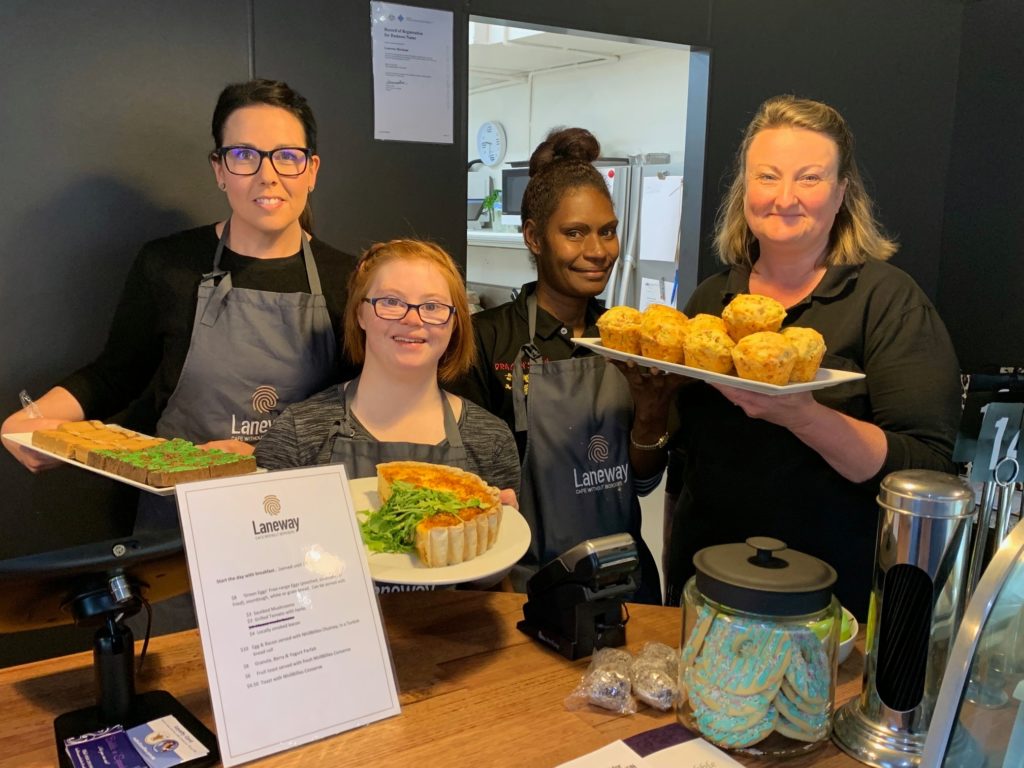
This funding, which will be available over the next two years, recognises the significant and long-lasting impacts of COVID and the localised effort needed to recover and rebuild vibrant remote, rural and regional communities.
From today, community groups and not-for-profit organisations in remote, rural and regional communities can apply for funding to support the recovery process, reduce social isolation, foster stronger, more resilient communities, or sustain these vital local organisations in their work.
The Australian Government’s support means that there will be $800,000 available in this round of SRC grants specifically for COVID-related projects. The COVID stream will have two tiers of funding – one will offer grants of up to $10,000 to groups working in communities of fewer than 50,000 people, while a second tier will offer grants of up to $50,000 for groups in remote, rural or regional communities (as defined by Australian Bureau of Statistics’ Australian Geography Standards).
Natalie Egleton, CEO of FRRR, said that the Australian Government’s investment is sorely needed and will be greatly appreciated by local organisations that have been struggling with raising funds, and coping with the effects of volunteer fatigue.
“At the end of last year, FRRR commissioned the Heartbeat of Rural Australia study, which confirmed that the pandemic has weakened the ability of community organisations to play their various roles in the community, at a time when, for many, demand for their services has increased.
“Many community groups that took part in the study – especially grassroots organisations with revenue of less than $50,000 – saw significant reductions in income as a result of not being able to run fundraising events and income-generating activities and, in some instances, funders redirecting their support. It’s also impacted the number of people able to volunteer, meaning that those remaining have been called on to do more, for longer. It’s no wonder people are exhausted.
“This program will help to rebuild rural communities by funding projects that respond to the ongoing impacts of COVID and will help communities get back on their feet.
“We’ve deliberately kept the SRC program flexible, as we know needs will be different from place to place, and from group to group. Projects eligible for funding could include supporting, training or attracting volunteers; running events; enhancing community facilities; developing services that assist people experiencing disadvantage; or purchasing equipment or resources that strengthen local organisations. We are very grateful for the Australian Government’s support and the commitment that they are showing to strengthen and rebuild rural communities,” Ms Egleton said.
In addition to the COVID funding stream, the SRC program still has grants available to support communities affected by the 2019/20 Black Summer bushfires. There is $650,000 available this round, through grants of up to $25,000. A third, more general stream of funding offers Small & Vital grants of up to $10,000 for initiatives that strengthen and support communities of 15,000 or fewer in remote, rural or regional areas.
To learn more about the program, and to apply, visit https://frrr.org.au/SRC. Applications close 31 May 2022 at 5pm AEDT.
The town of Dirranbandi, in southwest QLD, was suffering from a lack of Christmas cheer and the general community spirit was a bit flat, following relentless drought over many years. This was also having significant impacts on mental health.
In a bid to tackle these issues, while also putting Dirranbandi on the map for both tourists and locals, the Dirranbandi Progress Association used a $60,000 Tackling Tough Times Together grant, funded by the Australian Government to spark some joy in the township with a stunning lights installation.
With the support of Balonne Shire Council, the Dirranbandi Progress Association brought local tradespeople on board, as well as their local Arts Council, the business community and a work camp, which consisted of skilled prisoners who were being reintegrated back into society. Together, this dedicated team of people designed and fabricated a beautiful display of fairy lights that were installed and displayed throughout the main streets of their town all year round.
Alongside the permanent display, the grant funded Christmas lights, which is the main feature of an annual event attended by around 300 people. Locals from the around the community gather for a BBQ and watch the Christmas lights being turned on, while school children sing carols and everyone embraces the magic of Christmas.
Since having the lights installed and hosting these events, the local community, which was crippled by drought, has been able to congregate, reconnect and have its vibrant spirit reignited. As an added benefit, the local council committed to providing extra support and resources, not only for Dirranbandi, but for surrounding towns as a result of the project.
Deep in country Victoria, a definitive before and after makeover is apparent. For years the Golf Club of Warracknabeal, about 340 km north west of Melbourne, made do with a rusty and weathered roof sitting atop a building nearly 100 years old.
While the region is known for its grain, the town has been hit hard by the ravages of drought and subsequently COVID-19. Since the mid 1900s, the Warracknabeal Golf Club has held birthday parties, weddings, wakes, meetings and everything in between. A warm welcoming atmosphere has always been their intention, although this has become increasingly difficult to offer with the decline of the building, most notably its roof.
But with the support of a grant through FRRR’s Tackling Tough Times Together program, funded by the Australian Government, the Warracknabeal Golf Club launched their Green Roof Project.
With the $46,125 grant, and with the help of professionals and a swathe of willing and hardworking volunteers, they replaced the old leaking roof with a green’ roof. In addition to the new roof, the old and worn guttering was replaced and insulation and sisalation installed to facilitate far greater energy efficiency.
David Baxter from the golf club commented that modernising the building has reignited interest in the Golf Club as somewhere for people to gather and come together as a community in a now very comfortable environment.
“In recent years, we had seen very few functions but this year the increase in its use has been great. Organisations such as VFF, Lions Club, local schools, Grain Corp, the Arts Council and Lutheran Ladies have since used the facility and commented on the improvements particularly on the heating/cooling aspect.”
Mr Baxter noted his resounding gratitude for the project being able to go ahead.
“So much has been achieved thanks to the grant from FRRR, which made it possible earlier than we anticipated, as major fundraising over a number of years would have been required.
“More than ever, we are looking forward to becoming an important cog in our community in providing a place to meet, socialise and celebrate”.
